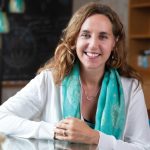Susan Kaech How T cells remember
Your brain isn’t the only part of your body that has a long-term memory. Long after your immune system has fought off an infection, memory T cells stick around in organs throughout your body, ready to quickly target returning pathogens.
Salk Professor Susan Kaech, director of the NOMIS Center for Immunobiology and Microbial Pathogenesis, has made it her mission to gain a better understanding of how these T cells form, how they exchange molecular signals with the surrounding tissue, and how we can use this knowledge to prevent or treat infections.
Inside Salk spoke with Kaech, who also holds the NOMIS Chair, about her career path and how the COVID-19 pandemic has affected her research.
Did you always want to be a scientist?
In high school, my favorite classes were physics, chemistry and math (yes, I actually liked doing trigonometry homework), but I was pretty naïve about scientific careers. In fact, the only science career I really knew much about was engineering, so I started college with a major in chemical engineering. However, my freshman year I signed up for biology as an elective course and it ended up being a complete life-changer. It was the first time I’d learned about cells and genetics and physiology—it was very different from my rudimentary high school biology class, which had focused mainly on taxonomy.
At the same time, as part of my financial aid package to attend college, I was given access to work-study jobs and I selected a really cool job to work in a lab that studied viruses that cause cancer. I worked on a project using anti-sense RNA technology to block viral gene expression, which was nearly 15 years before the Nobel Prize was given for RNA inhibition (RNAi) in 2006! So it was really interesting for me, then as a very young scientist, to watch and later realize that things that you were actually working on could, over time, have a huge impact in biology.
How did you begin studying T cells?
My PhD was in developmental biology, which I loved, but as I was getting closer to the end of my PhD I wanted to take some time to consider other areas of research. I’d been exposed a little to host-defense and immunology and understood the basics of how your immune system protects you from pathogens, but I started sitting in on immunology lectures and realized how exciting the field was and how inflammation and immunity are central to nearly every disease. In particular, I became fascinated with this concept of long-term immunity and saw a lot of unanswered questions about how this forms in our bodies.
What big questions about T cells are you trying to answer?
When I started my lab, using my background in developmental biology, my team and I were really focused on uncovering genetic pathways that control the formation of long-lived memory T cells. What happens in T cells when they’re exposed to a virus that gives them the ability to remember that virus? What signals dictate which T cells live to develop into memory T cells that remember the virus versus those that die after an immune response? Now, my lab has started to zoom out and look at how T cells cross-talk with the tissues around them. How do the immune cells change if the tissue is stressed? What if the tissue is affected by metabolic disease or cancer? We already know that lots of different proteins can alter T cells but we’re only beginning to understand how other types of molecules—like metabolites produced within tissues—can change T cell metabolism and activity.
This line of research can aid our understanding of chronic diseases and how the immune system adapts to disease over time. T cells stick around for years and years, so there’s bound to be adaptation in how they’re interacting with organs over that time frame.
At an even broader level, the questions we’re asking revolve around what inflammation is, in the first place. Why are some types of inflammation beneficial for the body and other types pathological, and what differentiates those at a molecular level?
How has the COVID-19 pandemic affected the trajectory of your work?
It’s certainly been an exciting year for the field and my lab, especially as the public has become so much more aware of the importance of immunology, vaccines and particularly, long-term immunity. We have been able to contribute to research on COVID-19 because we were already studying how memory T cells infiltrate the lungs in people with influenza and provide protection against reinfection. So we saw an opportunity to carry out similar studies in people with SARS-CoV-2. We’ve been looking at how memory T cells form in the lungs after COVID-19 or after immunization for COVID-19, and how long they stick around in each case. Understanding T cells in this context will help researchers develop better vaccines for not only COVID-19, but other pathogens or future pandemics.
I love that the general public’s appreciation for developing long-term immunity to pathogens is growing as well as their awareness and interest in understanding our immune system. I sincerely hope this interest lasts after the pandemic is over!
What are some of your favorite things to do outside of work?
I hang out with my family as much as I can. My husband Gerry Shadel [also a Salk Professor] and I have two teenage daughters and know we have a short period of time with them at home before they head out into the world. I also like to hike and cook, and I’ve recently started doing hot yoga! My happy places are hiking in the Cascades [of Washington State], snorkeling in coral reefs or just hanging out with friends and enjoying some wine in our backyard.
What do you wish the public better understood about the immune system?
I wish for the public in general to have a better understanding of what vaccines are doing at a cellular level. I think if more people understood the fundamental concepts about the immune system and how vaccines generate long-term immunity, it could help quell some fears about vaccines and mitigate some vaccine hesitancy. Many non-scientists don’t realize that what a vaccine is doing is helping your body generate these specialized memory T and B cells that have the ability to live in your body for decades. The vaccine itself doesn’t stick around, but these long-lived populations of cells do. And that is what gives you long-lasting immunity!
Where is your research heading next?
We are very excited about our work uncovering how T cells are controlled by locally available nutrients within tissues and how this is affected by diet, especially in the context of cancer, where we know diet and obesity play important roles. We are also starting to explore the interplay between T cells and the brain and neurons. Just like T cells can infiltrate the lungs, they can also infiltrate the brain—but we know almost nothing about what they do in the brain. We are eager to examine the long-term impact that these brain-resident T cells can have on brain health as we age and, conversely, how neurons can impact the function of T cells. Salk is such a world-class place to do neuroscience that I think it lends itself to being a place where we can study the ‘nervous’ immune system in new ways.
Support a legacy where cures begin.
Featured Stories
 Building a More Resilient WorldThe world is facing an array of health-related crises: COVID-19 and other infectious diseases, climate change, neurodegenerative conditions, cancers and many more. To tackle these daunting challenges, the Institute is embarking on a philanthropic campaign to focus on resilience: the biological adaptability that mitigates the effects of aging, resists disease and restores global wellness.
Building a More Resilient WorldThe world is facing an array of health-related crises: COVID-19 and other infectious diseases, climate change, neurodegenerative conditions, cancers and many more. To tackle these daunting challenges, the Institute is embarking on a philanthropic campaign to focus on resilience: the biological adaptability that mitigates the effects of aging, resists disease and restores global wellness. Susan Kaech – How T cells rememberSalk Professor Susan Kaech, director of the NOMIS Center for Immunobiology and Microbial Pathogenesis, has made it her mission to gain a better understanding of how T cells form, how they exchange molecular signals with the surrounding tissue, and how we can use this knowledge to prevent or treat infections.
Susan Kaech – How T cells rememberSalk Professor Susan Kaech, director of the NOMIS Center for Immunobiology and Microbial Pathogenesis, has made it her mission to gain a better understanding of how T cells form, how they exchange molecular signals with the surrounding tissue, and how we can use this knowledge to prevent or treat infections.
 Carl Procko – Lessons from carnivorous plantsStaff Scientist Carl Procko studies Venus flytraps and their close relatives, Sundew plants, to gain insight into the ultra-fast biochemistry of plants and how they can sense touch. It doesn’t hurt that these bug-eating plants are a great way to get kids—and adults—interested in science.
Carl Procko – Lessons from carnivorous plantsStaff Scientist Carl Procko studies Venus flytraps and their close relatives, Sundew plants, to gain insight into the ultra-fast biochemistry of plants and how they can sense touch. It doesn’t hurt that these bug-eating plants are a great way to get kids—and adults—interested in science. Nuttida Rungratsameetaweemana – Drawing from memoriesNuttida Rungratsameetaweemana, a Salk postdoctoral researcher who studies neuroscience, was introduced to the perplexities of the brain at age 14 during a chance encounter in a hospital waiting room.
Nuttida Rungratsameetaweemana – Drawing from memoriesNuttida Rungratsameetaweemana, a Salk postdoctoral researcher who studies neuroscience, was introduced to the perplexities of the brain at age 14 during a chance encounter in a hospital waiting room.



















































